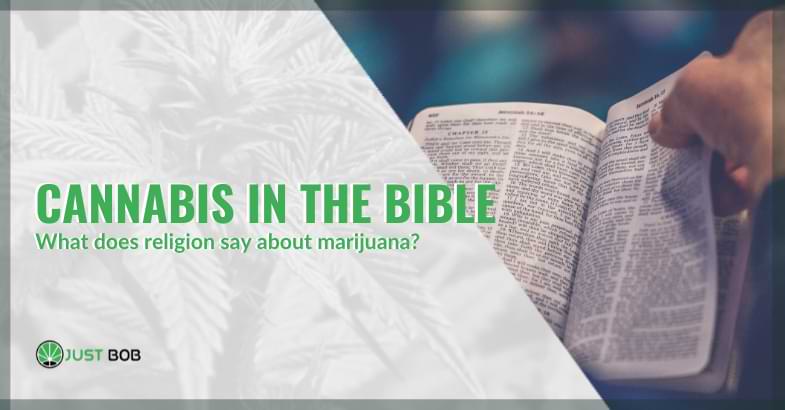Published on: 14/12/2023
Marijuana and Christianity: here’s what the Bible says
In today’s world, the debate surrounding the use of cannabis has reached unprecedented heights.
But what do religious texts, particularly the Bible, say about this controversial herb? Although the Bible does not directly mention marijuana, it provides valuable insights into how people should approach mind-altering substances.
Join us on a journey through religious perspectives as we explore the stance of Christianity, Judaism, and other Protestant denominations towards cannabis. This article delves into ancient texts, historical interpretations, and the ongoing dialogue within religious communities to shed light on what religion truly says about cannabis.


What religion says about cannabis
The Bible may not directly refer to marijuana, but we can clearly see what God’s attitude is towards such substances by reading his word.
Although marijuana may not have the same violent or dangerous effects known from other drugs, it is still a substance that takes you away from a clear state of mind. The Bible clearly exhorts us not to become intoxicated with wine (Ephesians 5:18), and this commandment also extends to losing ourselves in other substances.
“All things are lawful for me, but not all things are profitable; all things are lawful for me, but I will not be dominated by any thing.” 1 Corinthians 6:12.
This is a clear exhortation that even though some things may not be expressly forbidden, a disciple must avoid anything that could take power over him/her. Any substance that takes you away from a state of absolute clarity and sobriety has power over you, even if it is not something you will become addicted to.
But that’s more.
We can read in 1 Peter 5:8,
“Be sober, be vigilant, for your adversary, the devil, goes around like a roaring lion seeking whom he may devour.”
Satan is constantly trying to get people to sin. Or at least to prevent them from doing God’s will on earth. It is a constant battle not to fall into sin and out of God’s service. If we are not careful, it can be incredibly easy to let our guard down and start doing Satan’s will with our lives.
This is why it is so important to keep ourselves sober and vigilant. The Bible does not only mean “sober enough to get through the day,” but these verses mean that we must be as sober and vigilant as possible. If we are to resist Satan in faith, we must be in a proper state of mind.
Read also: Cloning a cannabis plant: how does it work?
Marijuanam, Judaism, and Christianity
Judaism has many elements in common with Christianity. Although Jews do not recognise Jesus as the Messiah, they believe in the importance of forgiveness, prayer, fasting and obedience to God’s laws.
The use of cannabis in ancient Jewish tradition is still debated. In 2020, Israeli archaeologists found traces of cannabis on artefacts stored in an 8th century BC temple in Tel Arad. According to some researchers, ‘kaneh bosem’, a plant mentioned in the Book of Exodus, and from which sacred anointing oil was extracted, refers to cannabis.
Regardless of how cannabis was used in antiquity, modern rabbis have different views on cannabis. In 1978, Orthodox Rabbi Moshe Feinstein pointed out that marijuana is forbidden by Jewish law because it prevents the faithful from praying and studying Torah. Other rabbis, on the contrary, are strongly in favour of medical cannabis.
Like Judaism, Christianity also expresses contrasting views towards cannabis. The more moderate orientations, including the Orthodox, Catholics and some Protestant churches, condemn the use of cannabis. However, other Protestant doctrines, such as the Presbyterian Church, the United Church of Christ and the Episcopal Church, approve of the use of medical cannabis.
According to some scholars, it is even the Bible that indirectly mentions cannabis:
“Behold, I give you every herb that bears seed on the face of the whole earth, and every tree that bears seed-bearing fruit; this shall be nourishment for you.”
This is an alleged authorisation for the use of cannabis, which, however, is countered by other passages, such as in Peter 5:8 – that we previously mentioned:
“Be sober, keep watch, for your adversary the devil goes around like a roaring lion seeking whom he may devour.”
Some Scripture experts provide further insights in support of cannabis. Based on references to the herb kaneh bosem, they claim that Jesus and his disciples used cannabis as an ingredient for the oil of holy anointing.


Did Jesus use cannabis?
British studies dating back to 2003 reveal that Jesus and his disciples were regular users of cannabis. In fact, it seems that the healing properties of this plant, the use of which has been disputed in recent years, were already well known in their time.
The proponent of this research is the scholar Chris Bennett. These started from the analysis of a substance often mentioned in the Bible and in particular in the Old Testament.
This is Kaneh-Bosm, which is said to be nothing more than cannabis extract. In the sacred text, one can read that this herb was used as an exchange substance and was found in the holy oil for anointings.
This discovery is extremely significant, particularly in the eyes of the theological community, if one considers the fact that claiming that Jesus used cannabis for his ointments could completely change perceptions of the facts known to us and of the world in general.
Cannabis oil was used by both Jesus and his disciples and this could be the explanation for the many miraculous healings they performed.
In those days it was easy to come into possession of cannabis and this explains the spread and use in various fields of this plant that is so controversial today.
Chris Bennett, besides showing the results of his research, also made the world think with this statement of his:
‘If cannabis was one of the main ingredients of the ancient anointing oil, and receiving this oil is what made Jesus the Christ and his Christian followers, then persecuting those who use cannabis could be considered anti-Christ’.
If his studies were to be confirmed, therefore, the Church would be obliged to revise many of its declarations, in particular that those who use cannabis could be considered anti-Christian. Today, medicine is fighting for the beneficial effects of cannabis to be recognised and for it to be prescribed without problems to sufferers of particular illnesses.
In fact, it has recently been verified that cannabis has important soothing effects and that it can consequently be very effective in alleviating pain caused by specific illnesses such as AIDS or multiple sclerosis.
According to studies in Tel Aviv, it also appears that the use of hemp helps to heal dysphagia, as well as decreasing pain and the onset of nightmares resulting from trauma or stress, and being an excellent cure for anxiety. Not to mention possible curative properties for cancer patients.
Read also: How is cannabis grown? A step by step guide
Conclusions
In conclusion, the discussion on what religion says about cannabis reveals contrasting perspectives within both Judaism and Christianity. While the Bible does not directly mention marijuana, the Scriptures emphasize the importance of maintaining sobriety and vigilance in one’s spiritual journey. The exhortations to avoid becoming intoxicated extend to all substances that may hinder a person from achieving a clear state of mind and focusing on God’s will.
The stance on cannabis within Judaism and Christianity varies among different denominations and religious scholars. Some Orthodox, Catholic, and certain Protestant churches condemn its use, citing its potential interference with prayer and religious devotion. On the other hand, some Protestant doctrines and individual rabbis support the use of medical cannabis for therapeutic purposes.
Debates surrounding the historical use of cannabis in ancient traditions further complicate the matter. Some researchers claim that ‘kaneh bosem’ mentioned in the Old Testament refers to cannabis, and some scholars argue that Jesus and his disciples may have used cannabis in holy anointing oils for healing and miraculous acts.
Modern-day research continues to explore the potential medicinal benefits of cannabis, which include pain relief, aid in managing certain illnesses, and reduction of anxiety. As medical evidence grows, it sparks discussions about revising longstanding beliefs and possibly challenging previous declarations regarding cannabis use.
Overall, the issue of cannabis in the context of religion remains a complex and evolving topic. It calls for respectful dialogue and careful consideration of both historical interpretations and contemporary findings. The balance between personal freedom and spiritual devotion underscores the importance of seeking wisdom and understanding in navigating these complex ethical and theological questions.
💡Takeaways on what religion says about cannabis
- The Bible and Sobriety: Although the Bible does not directly mention cannabis, its message on sobriety is clear. God exhorts us to avoid being dominated by any substance that takes us away from a state of mental clarity. Scripture warns against drunkenness with wine and this also extends to any other substance that causes us to lose clarity.
- Be vigilant against evil: The Bible invites us to be sober and vigilant because the devil tries to deceive us and turn us away from God’s way. To resist Satan, we must maintain a proper state of mind and not allow any substance to control us.
- Different views in Christianity and Judaism: In the Jewish and Christian traditions, views on cannabis are conflicting. Some moderate Christian rabbis and churches condemn it, while others are in favour of its medical use. There is no unambiguous consensus between the different religious currents.
- The biblical use of herbs: Some scholars claim that the Bible refers to the use of herbs, including ‘kaneh bosem’, which could be associated with cannabis. However, interpretations vary, and there is no definitive consensus on the issue.
- Jesus and cannabis: Some researchers suggest that Jesus and his disciples may have used cannabis as an ingredient for the sacred anointing oil. This theory has raised debates and if confirmed, could influence the perception of cannabis in Christian theology.
FAQ on what religion says about cannabis
What does the Bible say about cannabis?
While the Bible may not directly mention marijuana, it does exhort us to be sober and vigilant, avoiding anything that takes us away from a clear state of mind. The Bible warns against becoming intoxicated with substances like wine (Ephesians 5:18) and urges us not to be dominated by anything. Some scholars debate whether cannabis was indirectly referred to in the Bible, but its use remains a subject of varying interpretations among different Christian denominations and within Judaism.
What is the view of Judaism and Christianity on cannabis?
Views on cannabis vary within Judaism and Christianity. Some modern rabbis differ on the use of cannabis, with some forbidding it due to its potential to hinder prayer and Torah study, while others support its medical use. Similarly, among Christians, some denominations, like the Orthodox, Catholics, and certain Protestant churches, condemn cannabis use, while others, like the Presbyterian Church, the United Church of Christ, and the Episcopal Church, approve of medical cannabis. The debate is often fueled by interpretations of biblical passages and historical research.
Was cannabis used in biblical times, and did Jesus use cannabis?
The use of cannabis in ancient Jewish tradition is still debated. Some researchers suggest that ‘kaneh bosem,’ mentioned in the Book of Exodus and used for sacred anointing oil, refers to cannabis. Regarding Jesus, there are studies suggesting that cannabis, in the form of anointing oil containing ‘Kaneh-Bosm,’ was used by him and his disciples for healing purposes. However, these claims remain controversial and have varying interpretations among scholars and theologians.









